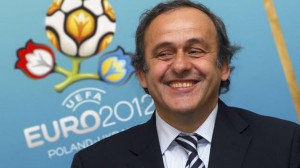
The recently aired BBC documentary, ‘Euro 2012: Stadiums of Hate’ has sparked debate in Britain and elsewhere around the world regarding the safety of fans and players at the upcoming European Championships as well as the broader issue of whether Poland, and particularly Ukraine, should even be hosting Europe’s biggest sporting event at all. The documentary, part of the BBC’s Panorama series, captured chilling scenes of violence, anti-Semitism and racism at football stadiums in the host nations and served to highlight this distinctly seamy aspect of football culture in Eastern Europe.
A criticism that has been made of the documentary in certain quarters is that it presents an excessively negative view and that it sensationalizes the subject. Yet the footage reveals problems whose existence alone should provoke extreme consternation irrespective of the regularity with which the portrayed events occur. The scenes include Nazi salutes, chants and symbolism; black players being taunted with monkey chants; a group of Indian students being targeted, surrounded and brutalized, in many cases in stadia that will soon be hosting matches at the European Championships.
Racism is a problem that football has been grappling with constantly in recent times. Much of the attention has been on the abuse of players of colour by fans through distasteful chanting, something Spain is unfortunately far from alien to. Players trading race-based insults has also been a concern. Incidents such as these tend to be captured by television cameras and as a result attract the greatest attention. However the abuse of players, abhorrent as it is, represents only a facet of a much broader problem.
These are testing times for Europe. The economic situation in most countries creates a climate conducive to the growth of extremist politics and ideas. Indeed, there has been a significant uptick in the power and influence of the far right around Europe. The European Commission put itself in a very uncomfortable position earlier this year with the release of a farcical video supposedly aimed at selling the European ideal to younger viewers. The video showed a white girl ostensibly battling for Europe against Brown, Asian and Black opponents, representing the rest of the world. The racial angle to this advert was painfully obvious. Widespread condemnation forced the video to be withdrawn, but just the fact that such a video could get through a series of filters without anyone realizing or indeed being perturbed by its implication is indicative of some of the issues Europe faces.
Returning once more to the subject of the European Championships, consider this: what would be the best-case scenario for UEFA and the respective governments with regards to the issue of racism? That the month passes without any incidents of racially motivated abuse targeted at players? Already this looks rather unlikely, yet if it does come to pass, the championships will be celebrated as a success and the prevalent fears going into the tournament will be declared to have been unfounded.
Reports already indicate that the number of foreign fans travelling to the tournament will be significantly lower than usual. Further, given the reputations of the host nations, it is difficult to imagine that there will be many supporters of colour who would brave the dangers and make the trip. The British government has already urged travelling Black and Asian fans to be extremely cautious, hardly an encouraging sign. So what does it say for Europe and the European ideal if, at the region’s premier sporting event, the only coloured faces in the stadia are the ones on the pitch? Is this the image of itself that an ailing Europe seeks to display to the watching world?
Olympic spirit
Thankfully for Europe there is another major sporting event this summer at a location that in this context could not be more different to the venues of the European Championships. London is a city in which race is a complete irrelevance at most times. The audience at the Olympics will be truly multicultural and properly diverse. The event will be a celebration of the right sort where everyone can join in without any fear, the way all great global sporting events should be. Euro 2012 will however be nothing of the kind. To celebrate it as a success would be a sad acknowledgement of Europe’s failings.
The two events represent a microcosm of the choice that faces the Old World. The European championships involve paying lip service to the ideal of pluralism while allowing monetary considerations to override any actual commitment to the same, whereas the London Olympics, despite the grandeur of the setting potentially being hamstrung by economic considerations, truly represents those qualities of inclusivity and diversity that are held up as inextricable aspects of the European ideal.
Leave a Reply
You must be logged in to post a comment.